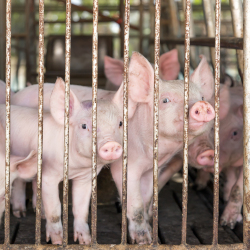‘Safe’ to Say . . .
TOP NEWS OF THE WEEK
We sued @SmithfieldFoods for misleading consumers with false claims of superior safety. Read the full complaint here. | We sued @SmithfieldFoods for misleading consumers with false claims of superior safety. Read the full complaint here. | Read the Full Article
Would you believe your Smithfield pork chop was the “safest possible” U.S. pork product—if you knew that pork products produced by Smithfield are commonly contaminated with dangerous pathogens?
And what if you knew that the U.S. Department of Agriculture frequently notifies Smithfield that pork processed product in its slaughter plants is more likely to be contaminated with Salmonella than similar products in slaughter plants of the same size?
Safe to say, you wouldn’t. Yet Smithfield makes that exact (false) claim, in hope of convincing more consumers to buy more Smithfield pork products.
Last week we sued Smithfield. You can read all of the reasons here, in the complaint.
There are a lot of reasons to dislike Smithfield, one of the four Big Meat corporations (along with Tyson, Cargill and JBS) that dominate industrial meat production.
There’s the animal abuse. The water pollution. The air pollution.
There’s the fact that Smithfield, a wholly owned subsidiary of WH Group of China, destroys rural communities in the U.S. in order to satisfy its own country’s insatiable appetite for pork.
And then there’s Smithfield’s exploitation of slaughterhouse employees. Smithfield, like the other Big Meat producers, has never been known for treating workers fairly or with dignity.
That situation is so bad now, during the COVID-19 crisis, that workers at one facility recently sued the company, for:
“ . . . failing to provide workers with sufficient protective equipment; forcing them to work shoulder to shoulder; giving them insufficient opportunities to wash their hands; discouraging them from taking sick leave; and failing to implement a plan for testing and contact tracing.”
But these aren’t the reasons we sued Smithfield. We sued the company for lying to consumers. Because there are laws against that. And we think consumers have the right to know when corporations lie to them.
Read ‘Food Safety Claims Land Smithfield Foods Inc. in D.C. Court’

